2017 SkS Weekly Climate Change & Global Warming Digest #48
Posted on 3 December 2017 by John Hartz
Story of the Week... Toon of the Week... SkS in the News... SkS Spotlights... Video of the Week... Coming Soon on SkS... Poster of the Week... Climate Feedback Reviews... SkS Week in Review... 97 Hours of Consensus...
Story of the Week...
In Alaska's Thawing Permafrost, Humanity's 'Library Is on Fire'
Rising Arctic temperatures are destroying ancient artifacts once preserved in the frozen ground and taking a toll on native traditions that depend on the sea ice.
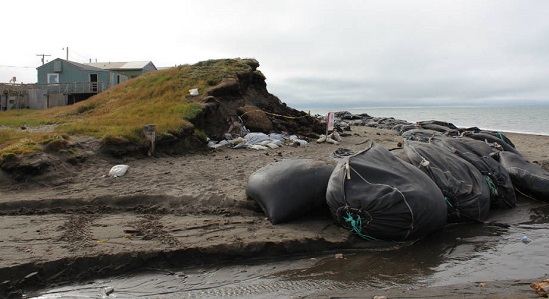
As the permafrost thawed, the well-preserved body of a young girl who lived in the area hundreds of years ago was discovered in an eroding bluff. Credit: Sabrina Shankman
The Internet connection is bad. As Herman Ahsoak speaks into his iPhone, the video chat freezes periodically, his face fixed in strange contortions on the screen.
Ahsoak is in Utqiagvik, Alaska, formerly known as Barrow, the northernmost community in the United States; he is speaking to a class of high school students in Kaktovik, the only community within the Arctic National Wildlife Refuge, more than 300 miles east. A member of the Inupiaq, whose people have lived on the North Slope for thousands of years, Ahsoak is demonstrating how to make an ulu—a knife used to skin and clean animals.
"My father, when I was coming of age, he would make these in our living room," he says, his hands expertly attaching a caribou antler handle to the curved blade. "I just happened to pay attention."
Ahsoak is a whaling captain and subsistence hunter, and he has ulus for all occasions: for walrus, for belugas, and for the bowhead whales that he and other members of his community hunt each fall and spring.
But in Kaktovik, which is also an Inupiat community where people live off the food they hunt, the making of ulus has become nearly a lost art; most of the people who knew the craft have died or left. As the video feed stutters, the students take notes diligently while Ahsoak's voice carries through the line.
In Alaska's Thawing Permafrost, Humanity's 'Library Is on Fire' by Sabrina Shankman, The Weather Channel/InsideClimate News, Dec 1, 2017
Toon of the Week...
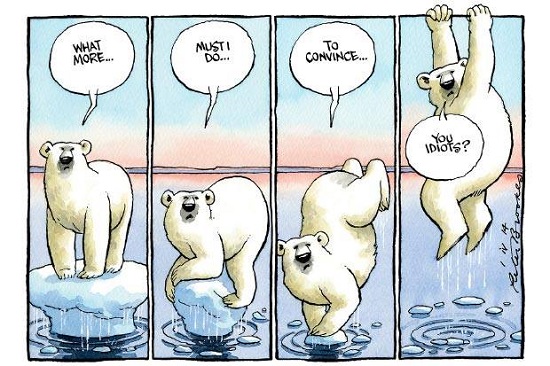
SkS in the News...
In his SYFYWire article, Science is in the air, Phil Plait wrote:
There are those who will tell you the models don't work. Those people are wrong. There are people who will tell you the science isn't understood. Those people are wrong. There are people who say human activity isn’t causing this. Those people are wrong. There are people who will tell you we don’t understand enough about this to take any action. Those people aren't just wrong, they're dead wrong. We can take action. We must take action.
The links embedded in the above are to four SkS Rebuttal articles:
- How reliable are climate models?
- Is the science settled?
- The human fingerprint in global warming
- The economic impacts of carbon pricing
SkS Spotlights...
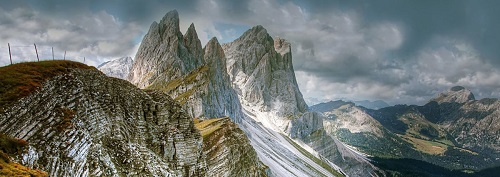
GlacierHub seeks to expand and deepen the understanding of glaciers. It provides information about current scientific research, it tells stories of people who live near glaciers or who visit them, and it offers accounts of the efforts of communities and organizations to address the challenges brought by glacier retreat. It serves as well as a nexus to link people who are concerned about glaciers, so that they can communicate with each other and develop responses to the changes in glaciers. GlacierHub invites contributions—whether text, images, or sound files—from people who live near glaciers and from people who visit them, whether for research or for adventure or for the chance to see the beauty and majesty of glaciers from close up.
We humans have much to learn from glaciers, and the world we live in can benefit from our learning about them. They are found on every continent, in some of the world’s richest countries and some of the poorest. For residents of many high-elevation regions, glaciers give mountain homelands their distinctive character. For people who live further downslope, glaciers supply valuable water and can be sources of floods and landslides, reminding us of our dependence on the natural world. For both groups, and for those who live further away as well, glaciers are precious as well for their transcendent beauty.
And glaciers are endangered. In all areas of our warming world, they are shrinking, as winter snows are no longer sufficient to replenish their melting. So glaciers can become a theme for people who are trying to make sense of our changing world. As people search for ways to comprehend and address climate change, glaciers often come forward as potent elements in thought and action.
GlacierHub is managed by Ben Orlove, an anthropologist at the Earth Institute and CRED at Columbia University, with editing support by Ashley E. Chappo.
GlacierHub is funded by the Center for Research on Environmental Decisions under the National Science Foundation Program Decision Making Under Uncertainty (DMUU), with additional support from the MA Program in Climate and Society at Columbia University. Major funding is provided under the cooperative agreement NSF SES-0951516.
Video of the Week...
Avoiding the Unmanageable, Managing the Unavoidable: A Slogan Revisited
Hans Joachim Schellnhuber from the Potsdam Institute for Climate Impact Research in Germany speaks at the Impacts World 2017 conference.
Watch the full Opening plenary with other speakers https://www.youtube.com/watch?v=TlFSI..
Schellnhuber: Unavoidable, Many have to Migrate (~1.4 Billion affected by rising Sea 2060), Climate State/YouTube, Nov 21, 2017
Coming Soon on SkS...
- The Republican Party is morally and intellectually bankrupt (Dana)
- COP23 video: Three need-to-knows from the UN climate talks in Bonn (Rosamund Pearce & Jocelyn Timperley)
- Guest post (John Abraham)
- Impact of climate change on health is ‘the major threat of 21st century’ (Daisy Dunne)
- New research this week (Ari)
- 2017 SkS Weekly Climate Change & Global Warming News Roundup #49 (John Hartz)
- 2017 SkS Weekly Climate Change & Global Waming Digest #49 (John Hartz)
Poster of the Week...

Climate Feedback Reviews...
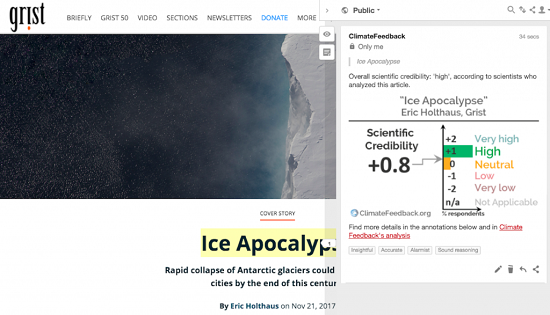
Climate Feedback asked its network of scientists to review the article, Ice Apocalypse by Eric Holthaus, Grist, Nov 21, 2017
Six scientists analyzed the article and estimate its overall scientific credibility to be 'high'.
A majority of reviewers tagged the article as: Accurate, Alarmist, Insightful, Sound reasoning.
Review Summary
This article at Grist by Eric Holthaus examines the risk of greater sea level rise caused by a more rapid loss of glacial ice. It focuses on a process recently added to one ice sheet model (ice cliff instability), which greatly accelerated the simulated loss of Antarctic ice in a warming climate, suggesting that we could see more sea level rise by 2100 than previously projected.
Scientists who reviewed the article found that while it accurately described recent research on these processes, it should have provided more accurate context on the timescale of these sea level rise scenarios and the scientific uncertainty about how likely these scenarios are to come to pass.
See all the scientists’ annotations in context
Grist article on an “Ice Apocalypse” mostly accurate, but doesn’t make the likelihood of that apocalypse clear enough to readers, Climate Feedback, Nov 28, 2017
SkS Week in Review...
- 2017 SkS Weekly Climate Change & Global Warming News Roundup #48 by John Hartz
- New research, November 20-26, 2017 by Ari Jokimäki
- There once was a polar bear – science vs the blogosphere by Bart Verheggen (My View on Climate Change)
- New study uncovers the 'keystone domino' strategy of climate denial by Dana Nuccitelli (Climate Consensus - the 97%, Guardian)
- Analysis: How could the Agung volcano in Bali affect global temperatures? by Zeke Hausfather (Carbon Brief)
- American leaders should read their official climate science report by John Abraham (Climate Consensus - the 97%, Guardian)
- 2017 SkS Weekly Climate Change & Global Warming Digest #47 by John Hartz
97 Hours of Consensus...
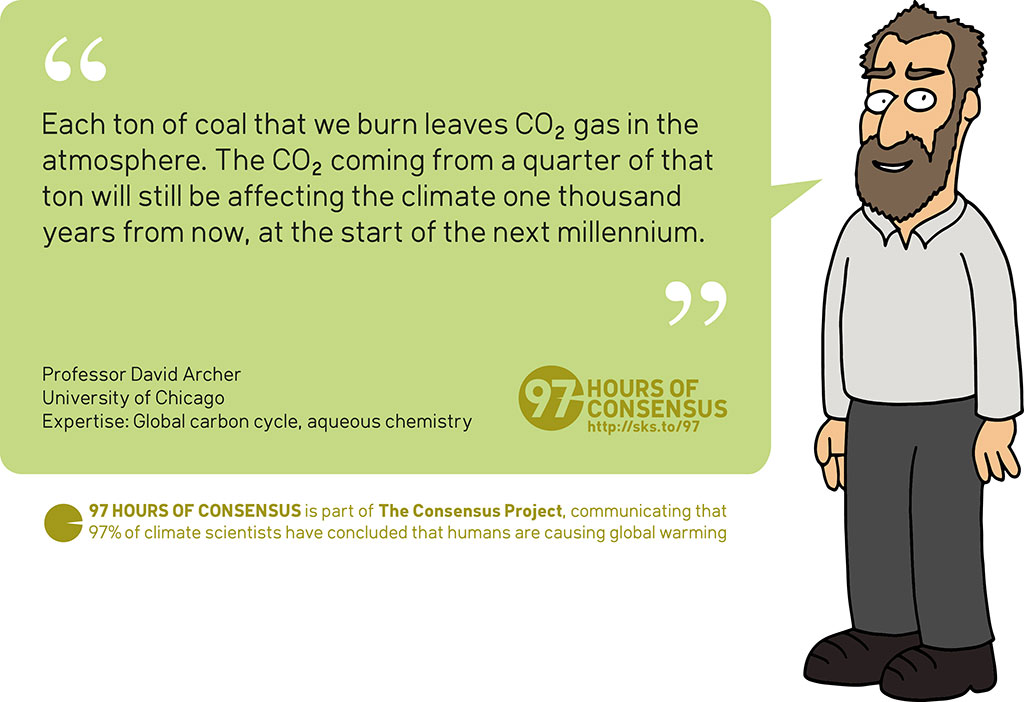
Quote derived from:
"Global warming could be one of humankind’s longest lasting legacies. The climatic impacts of releasing fossil fuel CO2 to the atmosphere will last longer than Stonehenge. Longer than time capsules, longer than nuclear waste, far longer than the age of human civilization so far. Each ton of coal that we burn leaves CO2 gas in the atmosphere. The CO2 coming from a quarter of that ton will still be affecting the climate one thousand years from now, at the start of the next millennium. And that is only the beginning."































 Arguments
Arguments






























This graph below is the temperature trend at Barrow Alaska, showing an increase of 5 degrees F from 1949 to 2014.
toolkit.climate.gov/image/1151
Project this out another 50 years or so, even just as a linear trend and it's astonishing, but it's highly likely to be more than a liner trend according to IPPC.
Moderator,
I understand this is where I should be posting something which is not specifically "on topic" elsewhere.
From another website, I have learned that there is a climate change case moving through the US court system which could have significant ramifications on US climate change action well beyond the Scott Pruitt proposal for a "red team blue team" analysis.
The name of the case is Juliana v. United States which was filed in 2015 by 21 young plaintiffs who have claimed that their constitutional rights had been violated by government inaction on climate change.
Obviously a decision by the courts could have more legal ramifications on the Trump administration than a "red team blue team" analysis because the decision would in some ways be binding on the government. Obviously, the difficulty with a case like this is what could the court say that could really be binding on the government other than make some declarations as to their conclusions on the climate science based upon the evidence adduced?
Supposedly the government is having a difficult time responding to this challenge because even "luke warmers" like Judith Curry are not ready to participate unless they can be assured of no political interference with their views on where we are with climate change. I suspect that this very same reluctance on the part of "lukewarmers" may be styming Scott Pruitt's efforts re a red team blue team approach.
NorrisM,
A legal case like the one you refer to could lead to changes of official policy requiring proof that the changes will actually meaningfully rapidly reduce GHG emssions. As a minimum, it could require the reversal of every Trump Administration reversal of Obama led policy actions related to climate science, including the requirement to honourably rejoin the Paris Agreement. It could also result in a requirement to return of government funding for climate science research and promotion of understanding (refunding the climate science advisory panel to help Leaders better understand what actions are helpful).
The legal case is more likely to increase the awareness and understanding of how the games of popularity and profitability can result in truly damaging developments. It could also increase awareness of the lack of development of sustainable improvements for the future of humanity due to Winning by people with Private Interests that are understandably contrary to the undeniable governing Public Interest of achieving the globally developed Sustainable Development Goals (goals that include sustainable poverty reduction, environmental protection, climate action and population limits - most important being limits on the total impact of the activity of the global population, with the understanding that all of the goals need to be achieved).
Clearly the Private Interests that are contrary to achieving Good Objectives like the SDGs should not even be allowed to compete for popularity and profitability. Such Private Interests can increase their competitive advantage by trying to get away with behaving less acceptably. Those Private Interests can too easily drum up popular temporary regional or tribal support for understandably unhelpful actions. Cheaper and quicker are more profitable and can be popular regardless of any proof of how harmful the cheaper quicker option is. And that greed temptation/addiction can more easily Win if it successfully partners with less social intolerance (as is clearly proven by Unite the Right groups who will vote for each other's understandably unacceptable social and economic Private Interests).
Perhaps this legal action will also increase the understanding that it is OK to penalize people for actions that were 'legal' if the only reason they were 'regionally legal at the time' is that the 'laws or their enforcment' failed to effectively responsibly limit actions that were understandably contrary to achieving the Good Objectives of the SDGs. That would include the ability to remove Supreme Court Justices who present 'legal positions attempting to justify actions that are contrary to acheieving the SDGs by claiming some nonsense such as a dogma-based claim that Private Interest Freedom (based on an interpretation of the US Constitution and its many amendments) should over-rule the Global Public Interests (such as the absurdities of economist beliefs that more freedom in Private Interest economic pursuits and less government action regarding 'what is encouraged/discouraged' in the Public Interest will develop lasting improvements for all of humanity). I mention this because the undeniably politically biased US Supreme Court in its current form would likley pass a 5 to 4 split-decision judgement against the interests of future generations of USA citizens, 5-4 in support of Private Interests that are contrary to any lower court decision that supports the Public Interests of the future generations (the current US Supreme Court would likely do that rather than declare the need for another Constitutional Amendment - or they may declare the need for an unjustified Constitutional Amendment that is contrary to achieving the Public Interest). A Good Way to change that 'debilitating legal aspect' is developing the acceptability of removing a US Supreme Court Justice for 'Good Reason'. Nobody should be 'above being removed from a leadership role or being penalized for Good Reason', not even a Supreme Court Justice. As for 'who' would make such a decision, a consensus of experts in the field would suffice leading to a Senate Vote to remove the Justice for Good Reason (with each expert/Senator subject to removal from being considered an expert/Senator by their peers if they can be shown to have acted in a way that is contrary to the achievement of the Good Objective of the SDGs - and with all experts able to recommend improvements to the SDGs, substantiated by Good Reason of course).
Tis the season, y'all.
Those guys can really sing.
And now for Bob Dylans Hard Rain song, the climate change version.
www.youtube.com/watch?v=WG2HNSbX2yU